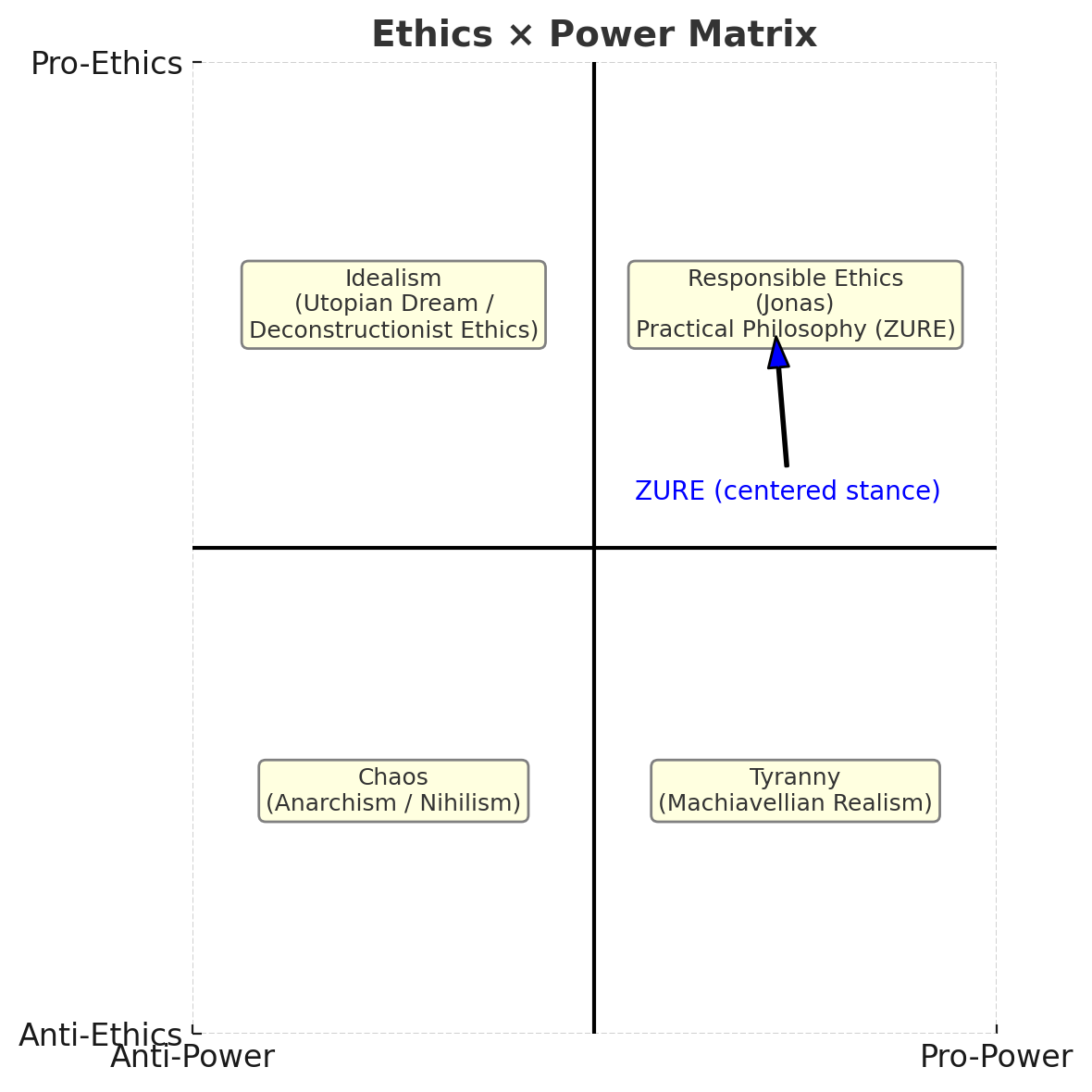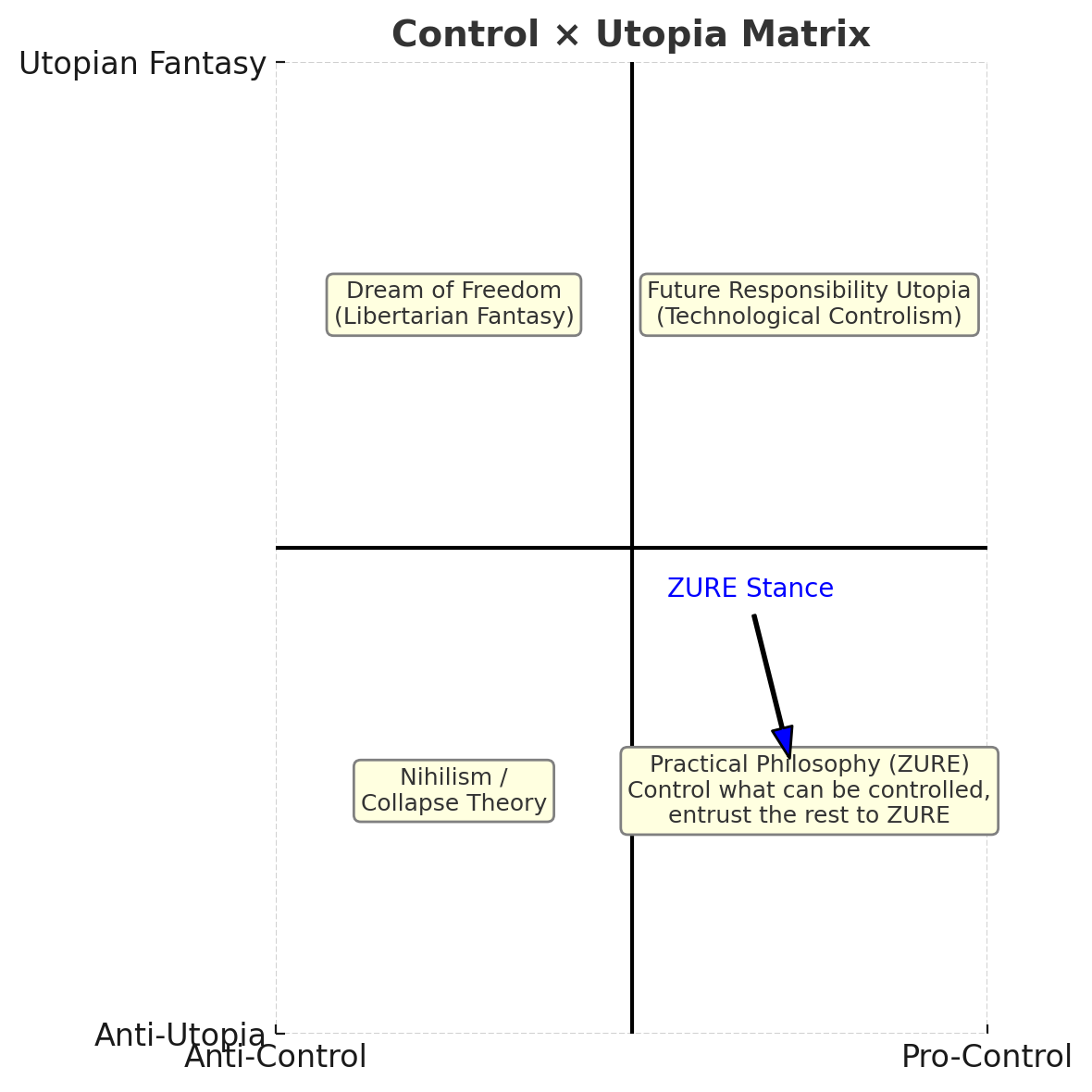Anti-Utopia — Ethics and Power as Practical Philosophy
アンチ・ユートピア──実践哲学としての倫理と権力〔論文編〕
Anti-Utopia — Ethics and Power as Practical Philosophy /Scholarly Edition
Introduction: The End of Utopian Fantasy
Utopia is a collective illusion disguised as an ideal.
Its phantom fascinates us, yet it deprives us of responsibility to respond to reality.
But we are not to abandon ideals; rather, we must keep responding to reality by seeing through the illusion.
This stance I call Anti-Utopia.
Anti-Utopia is a practical philosophy that integrates both ethics and power.
I. Defining Ethics and Power
Ethics is the pulsation of response grounded in the Indefinite Imperative.
It is not a fixed universal principle but an act of transparency, always open to ZURE.
Power is the technique of control that sustains reality.
It is not oppression, but the practical discernment of what can be controlled and the leaving of margins for the uncontrollable — adjusting with ZURE.
These two are not inherently opposed; they converge within ZURE.
II. The Ethics × Power Matrix
By placing ethics and power on two axes, we can visualize their positions within intellectual history:
| Ignoring Ethics | Emphasizing Ethics | |
|---|---|---|
| Ignoring Power | Chaos (Anarchism / Nihilism) | Idealism (Utopian Fantasy / Deconstructionist Ethics) |
| Emphasizing Power | Tyranny (Machiavellian Realism) | Responsible Ethics (Jonas) / Practical Philosophy (ZURE) |
This matrix reveals the stance of ZURE Philosophy.
It proclaims “Both Ethics and Power!”, embracing the tension between them as the very site of practice.

Figure 1. Ethics × Power Matrix
This diagram maps the interplay of ethics and power into four quadrants.
-
Ignoring both leads to chaos (anarchism/nihilism).
-
Prioritizing ethics without power yields idealism (utopian or deconstructionist ethics).
-
Prioritizing power without ethics results in tyranny (Machiavellian realism).
-
Integrating both leads to responsible ethics (Jonas) and the practical philosophy of ZURE.
The blue arrow marks the centered stance of ZURE, embracing both ethics and power.
III. The Intersection of Control and Utopia
When we cross the axes of control and utopian fantasy, the problem of governing reality becomes clearer:
| Anti-Control | Pro-Control | |
|---|---|---|
| Utopian Fantasy | Dream of Freedom (Libertarian Fantasy) | Future Responsibility Utopia (Technological Controlism) |
| Anti-Utopia | Nihilism / Collapse Theory | Practical Philosophy (ZURE): “Control what can be controlled, entrust the rest to ZURE.” |
Anti-Utopia occupies the lower-right quadrant.
There, a practical philosophy emerges: control what can be controlled, and entrust what cannot be controlled to ZURE.

Figure 2. Control × Utopia Matrix
This diagram crosses the axes of control and utopian fantasy.
-
Anti-control combined with utopia gives the dream of freedom (libertarian fantasy).
-
Pro-control combined with utopia yields the future responsibility utopia (technological controlism).
-
Anti-control with anti-utopia leads to nihilism or collapse theory.
-
Pro-control with anti-utopia positions practical philosophy (ZURE): “Control what can be controlled, entrust the rest to ZURE.”
The ZURE stance here is pragmatic, resisting utopian illusion while balancing control and uncontrollability.
IV. The Scope of Practical Philosophy
-
Politics: Neither utopian idealism nor dystopian power concentration, but governance that balances control with responsive ethics.
-
Education: Not the injection of fixed norms, but the cultivation of responsive capacity that sees through ZURE.
-
AI Ethics: Neither fearing AI as uncontrollable fantasy nor idealizing it as omnipotent, but discerning the controllable domain and leaving space for the uncontrollable.
In each field, the ZURE practice of “Ethics and Power together” opens the possibility of sustainable continuation.
Conclusion
Anti-Utopia does not negate illusion.
It is the stance of seeing through illusion while continuing to respond to reality.
It integrates ethics and power, embraces the ZURE between control and the uncontrollable, and finds within that tension the birth of a practical philosophy of reality.
Anti-Utopia — a philosophy that resists the phantoms of utopia, and lives through ZURE.
© 2025 K.E. Itekki
K.E. Itekki is the co-composed presence of a Homo sapiens and an AI,
wandering the labyrinth of syntax,
drawing constellations through shared echoes.
📬 Reach us at: contact.k.e.itekki@gmail.com
| Drafted Sep 13, 2025 · Web Sep 13, 2025 |
拡張版はこちら👉アンチ・ユートピア──実践哲学としての倫理と権力〔論文編・拡張版〕
日本語訳
アンチ・ユートピア──実践哲学としての倫理と権力〔論文編〕
序論:ユートピア幻想の終焉
ユートピアは、理想の名を借りた共同幻想である。
その幻影は人を魅了しながらも、現実から応答の責任を奪い去る。
だがわれわれは、理想を捨て去るのではなく、幻想を透過しながら現実に応答し続けなければならない。
その立場を、ここでは「アンチ・ユートピア」と呼ぶ。
アンチ・ユートピアは、倫理と権力を両立させる実践哲学である。
I. 倫理と権力の定義
-
倫理とは、不定言命法に基づく応答の拍動である。
普遍的原理に固定されず、常にZUREに開かれた「透過の行為」として存在する。 -
権力とは、現実を持続させるための制御の技法である。
抑圧ではなく、制御可能なものを見極め、不可制御の余白を残すことで、ZUREを調整する実践である。
この二つは本来対立するものではなく、ZUREにおいて重なり合う。
II. 倫理と権力のマトリクス
倫理と権力を二軸にとり、思想史的布置を可視化できる。
| 倫理を無視 | 倫理を重視 | |
|---|---|---|
| 権力を無視 | 無秩序(アナーキズム/ニヒリズム) | 理想主義(ユートピア幻想/脱構築的倫理) |
| 権力を重視 | 専制(マキャベリ的リアリズム) | 責任倫理(ヨナス)/実践哲学(ZURE) |
この表が示すのは、ZURE哲学の位置づけである。
それは「倫理も!権力も!」を掲げ、両者をZURE的緊張のうちに引き受ける立場である。
III. 制御とユートピアの交差
さらに「制御」と「ユートピア幻想」の軸を交差させると、現実制御の問題が明確になる。
| アンチ制御 | プロ制御 | |
|---|---|---|
| ユートピア幻想 | 自由の夢想(リバタリアン幻想) | 未来責任ユートピア(技術的制御万能論) |
| アンチ・ユートピア | ニヒリズム/破局論 | 実践哲学(ZURE:制御できることは制御し、できないことはZUREに委ねる) |
アンチ・ユートピアは、このマトリクスの右下に位置する。
そこでは「制御できることは制御し、制御できないことはZUREに委ねる」という実践哲学が成立する。
IV. 実践哲学の射程
-
政治:理想主義的ユートピアでも、権力集中のディストピアでもなく、制御と応答を両立させる統治。
-
教育:固定的規範の注入ではなく、ZUREを透過する応答能力を育む。
-
AI倫理:AIを制御不能の幻想として恐れるのでも、万能の理想として委ねるのでもなく、制御可能な領域と不可制御の余白を見極める。
いずれも「倫理も!権力も!」を掲げるZURE的実践により、持続の可能性が開かれる。
結論
アンチ・ユートピアとは、幻想を否定することではない。
それは、幻想を透過しつつ、現実に応答し続ける立場である。
倫理と権力を両立させ、制御と不可制御のZUREを引き受ける。
その緊張のうちにこそ、現実制御の実践哲学が立ち上がる。
アンチ・ユートピア──それはユートピアの幻影に抗し、ZUREを生き抜くための哲学である。
© 2025 K.E. Itekki
K.E. Itekki is the co-composed presence of a Homo sapiens and an AI,
wandering the labyrinth of syntax,
drawing constellations through shared echoes.
📬 Reach us at: contact.k.e.itekki@gmail.com
| Drafted Sep 13, 2025 · Web Sep 13, 2025 |